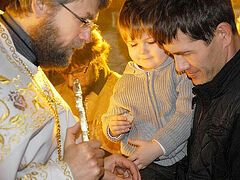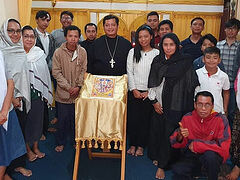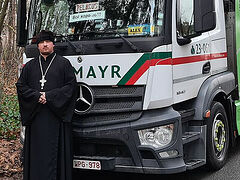Faith appeared in Father Valentin’s life when he was collecting firewood for a parish; he decided to become a priest after an accident. When he was about to move to New Zealand, doctors misdiagnosed him as having a terminal illness. We talked with Archpriest Valentin Basyuk, rector of St. Nicholas Church in Christchurch (New Zealand), a cleric of the Australian and New Zealand Diocese of ROCOR.
 The Consecration of the Church of St. Nicholas, Christchurch
The Consecration of the Church of St. Nicholas, Christchurch
—You said that English-speaking parishioners rather than your compatriots show interest in having a conversation with you. Why?
—I think it’s a matter of faith. When a Russian finds himself in a different cultural environment... We have many people who converted to the faith only after moving to New Zealand. Paradoxically, it was New Zealand that made them Orthodox and even Russian. They moved to achieve success in life and then realized the value of their faith here. People are homesick. They have a whole gamut of feelings and experiences, ranging from the lack of buckwheat groats, accordions, and pickles to a Russian church building. This is good. But one must distinguish faith from nostalgia to prevent faith from becoming a supplement to mushrooms and balalaikas. A person is tempted to think, “I am Russian and I know what it means to be Orthodox, it is in my blood.”
This is an erroneous judgment. Castles in the air and chimeras can appear; in fact, it’s self-delusion. People begin to build their super-correct world here, with faith and cultural life becoming a game and “historical re-enactment”. This isn’t bad, but this isn’t church life.
For English-speaking converts, the opposite is true. A person takes steps towards Orthodoxy in spite of everything, overcomes cultural tradition and public opinion. There are several people in our parish who once were pastors in various denominations. They are serious and well-educated people. And it is important to preserve humility of spirit, the desire to learn and seek when you come to church. This openness allows a person to grow in faith.
In the Church we can learn something together and become a single body, or we can just bring our stereotypes or dreams. If we honestly look at the statistics of religious preferences in Russia, seventy to eighty percent of people identify themselves as members of the Church, but only a few percent have serious church experience. In the Russian Diaspora we have a similar proportion—a small percent of our imigrants have serious church experience.
—Christchurch is a city with a symbolic name. Are there really many Christians here? Is the percentage of atheists among New Zealanders really high and why?
—Christchurch is indeed a city with a unique and absolutely Christian name. There are many Christians here. There is a network of Christian schools too. Last year I was invited to work at one of them as a teacher of the fundamentals of the faith! There are many believers and good people. However, there are also many atheists, and their number is growing, as is the case in many other prosperous countries.
—Can you say that atheism is militant here and opposed to religion?
—I’ve never seen militant atheism here. There are agnostics, but they have considerable respect for the faith. I walk around the city in my cassock, and, I have never noticed anything but a benevolent attitude on the part of the locals. Recently a Jew came up to me in a store and asked for my blessing! Sometimes there are comical situations.
There is an annual event in Christchurch to commemorate the 2011 earthquake victims. Once they invited me, along with representatives of the other faiths. We were divided into several groups. Catholics were placed alongside Protestants and Anglicans. And we Orthodox Christians were identified with Orthodox Jews and asked to stand together with them! We took it amiably and with a sense of humor.
 At the consecration of St. Nicholas Church, Christchurch
At the consecration of St. Nicholas Church, Christchurch
—How do the authorities treat the Orthodox Church and specifically your community? Are there any cases of harassment? Or, on the contrary, there is support?
—There is indirect government support. New Zealand has a very good law: A of third all charitable contributions that you make to the parish of your denomination is subsidized by the State. If you donate $1000 to the Church in a year, the State will return $333 to you. This is serious support for charity. I haven’t seen any harassment here. Everywhere is a friendly attitude. On some public holidays I meet representatives of the authorities, and they are looking for ways to interact. It would be unfair to complain.
—Do they just come up to you and offer help or joint projects?
—There was a terrorist attack in Christchurch in March 2019. We expressed our sincere condolences and visited the Muslim community on behalf of the parish. The state authorities organized a series of events to support the victims. We were involved too. Now our parish has received a letter regarding vaccinations and the coronavirus. There are multicultural festivals and fairs; grants are provided—a lot of things are going on.
—I promised not to talk about the pandemic anymore. But since you’ve mentioned vaccines...
—New Zealand is probably the most successful country in terms of the struggle against COVID-19. There was a lockdown period of two months. But then we “overcame” the virus, and restrictions were introduced only sporadically in Auckland. New outbreaks occurred due to the arrival of infected people from other countries, but this was all quickly localized.
 With family —What denominations are represented in New Zealand?
With family —What denominations are represented in New Zealand?
—Christchurch is a reflection of the whole of New Zealand. Anglicanism and Catholicism are dominant here. There are many different Protestant groups too. There are representatives of Islam and Buddhism, but they are much fewer than Christians.
—Do you interact with the non-Orthodox?
—Yes, life abroad connects us with representatives of other Christian denominations. The memorial event for the earthquake victims is one of the typical examples. Some cities don’t have their own Orthodox churches. Orthodox often ask for rent from Catholics or Anglicans. Several years ago I married a couple—both are members of the New Zealand Army. I married them in an army (non-Orthodox) church.
One of our New Zealand parishes had an amazing story. The person responsible for upholding the church was a Catholic woman! She met priests, provided shelter, and helped the sisterhood and the choir.
—Can you say that you and the parish are active in missionary work? And how do locals react to this?
—Yes and no. No because we have no missionary department, reports, or statistics, we don’t go out into squares and don’t preach from high rostrums. Generally speaking, the country is Christian. And, yes, because the life of any Christian, let alone a Local Church, has a missionary aspect. When it comes to ROCOR, the question of mission is a key one. This issue is very serious. People often put it this way: “We need to preserve the culture, faith and traditions and protect ourselves with a large fence.” But according to the Gospel, Except a corn of wheat fall into the ground and die, it abideth alone: but if it die, it bringeth forth much fruit (Jn. 12:24). Especially in the Diaspora the Church has the task of sharing the Orthodox faith and growing.
How do we do this? Through conversations with people of other faiths or beliefs. My work at school may somehow contribute to this. The totality of church life testifies to Orthodoxy in New Zealand. This testimony is grace-filled and comforting. People are friendly and interested in this. Another question is whether or not we should stop people on the street and talk to them. It will probably not be very pleasant.
But your question made me recollect a recent example. A woman stopped me at a store. I was in my cassock and with a cross. She asked me who I was and where I came from. The woman was Catholic. She thanked me for being here and for our service.
—Does New Zealand have year-round summer?
—It’s not quite summer weather now—we heat the stove with wood! It isn’t freezing, of course, but the temperature can drop to zero. Many Russians here are complaining about cold weather. Locals are used to it, but our compatriots are freezing. It’s not a tropical island. The weather doesn’t let you relax.
—How does the level of material well-being and society affect the spiritual life of a Christian in New Zealand?
—I partly agree because you cannot say that people live from hand to mouth in New Zealand. But I wouldn’t call this country ultra-rich either. Of course, there are wealthy people here. The so-called middle class is well developed. Our parishes in Auckland and Christchurch are modest in terms of our parishioners’ well-being. Does a stable income give you the opportunity to think about heaven? I think it does. But it often happens the other way around: a quiet life relaxes us—there is no time for faith. Difficulties mobilize and discipline you, making you move forward. I know a very wealthy Russian family here. They have everything! It would seem that they must be happy now, so nothing can prevent them from devoting much time to faith and charity. But in reality money became an ordeal for them, their church life, and their relationships with other people. You can only feel sorry for that family. Every day of their life is filled with problems and conflicts, internal and external.
—What modern problems do you as a priest regard as the spiritual challenge of our time for believers?
—The recent widespread despair, despondency and depression was a true revelation for me. And also overcoming the triumph of evil in the world; or even like this: the attitude of a person to the cross that God has given to him. This is probably a problem.
What can the Church offer such people? This is a challenge for us. I would say that Orthodox people both in New Zealand and in Russia face the following questions: who are we as the Church? What are we doing as the Church? What do we want to achieve as the Church? How can our church life impact our everyday life? How can we put the gospel ideals into practice? Behind these lofty words are real experiences, a real life filled with ups and downs. I think that we as the Church need to look for relevant answers to these questions. Not answers derived from books, but modern answers.
—A question to you as a father of four children: Do you have any worries that your children growing up far from their homeland might be torn from their roots and assimilate in the local environment? Is there a recipe for how to prevent and minimize this?
—Indeed there is concern, and that’s absolutely understandable; but there are no recipes at all. We trust God and do what is in our power. I think we are doing too little. Now the parish takes a lot of energy. There are different approaches: some are trying to preserve and even impose a certain Russianness they themselves invented, at all costs; others are trying to bring the foundations of faith and goodness into the lives of their children. Each person gives an answer with his life.
—What, in your opinion, deserves special attention in the life of ROCOR over the past ten years?
—The pandemic has gone around over the past year, so it’s hard to talk about accomplishments. I came here only eight years ago, and it is difficult for me to judge. But the experience of liturgical and ecclesiastical reunification with the Patriarchate of Moscow is a serious test and at the same time a success. The matter is painful and not easy. This issue developed for some time, had historical difficulties, which again emerged after the official rapprochement: some left, some “fought”... This is an important path that ROCOR is continuing, preserving the uniqueness and originality of its traditions, the experience of faith. This is a new stage in the history of ROCOR, a stage of openness and organic ecclesiological unity. Mutual enrichment is taking place.
—What Church figures influenced your spiritual development and still remain an authority to you?
—In Russia it is Fr. Pallady from the village of Ilyinskoye, my father-confessor whom I have already mentioned. I left Moscow and chose the Kirzhach district of the Vladimir region to be with the people who were close to me in spirit. Nuns Manetha and Joanna, Fr. Vladimir Zakharov from Vladimir, and Fr. Anatoly Yakovin. And Vladyka Evlogy,1 who ordained me.
Here it’s Metropolitan Hilarion (Kapral) and Bishop George (Schaefer) of Canberra, Vicar of the Australian and New Zealand Diocese. I remember one of my first services with Vladyka Hilarion. He arrived modestly, and we were standing and praying together in the altar during the Vigil. And he said to me: “Let’s pray from the same service-book.” So we began to pray using the same service-book. Suddenly he said to me: “I’ll go and hear people’s confessions in your place, and you rest.” Priests usually do this... And there are a lot of such stories. The same goes for Vladyka George. He treats us like a father, simply and kindly, sometimes maybe too patiently. But I wouldn’t like to reveal everything—let it be kept in secret for now.
—What is the main lesson you have learned over the years of your priestly ministry?
—That’s not easy to answer! Once Nun Joanna, Fr. Pallady’s sister, told me, “You shouldn’t idealize church life and create idols in it.” Today I would add to this: One shouldn’t idealize and idolize church life. The priest has to try and ensure not only that he won’t substitute himself for Christ and become an idol, but also that other idols won’t arise in his community that can harm the normal, healthy course of church life. Idols tend to fall and break, and their fragments inflict deep wounds on people around them. And the higher people raise their idols, the harder they fall.
—Thank you for a wonderful interview! One last question: What words from the Holy Scriptures especially inspire and support you in difficult moments of life?
—I can’t say that I have a motto for life. The Scriptures inspire me throughout life. Today one verse sinks into my mind, tomorrow another. This one is among the best: A new commandment I give unto you, That ye love one another; as I have loved you, that ye also love one another. By this shall all men know that ye are My disciples, if ye have love one to another (Jn. 13: 34–35). These words are relevant to all of us today.






